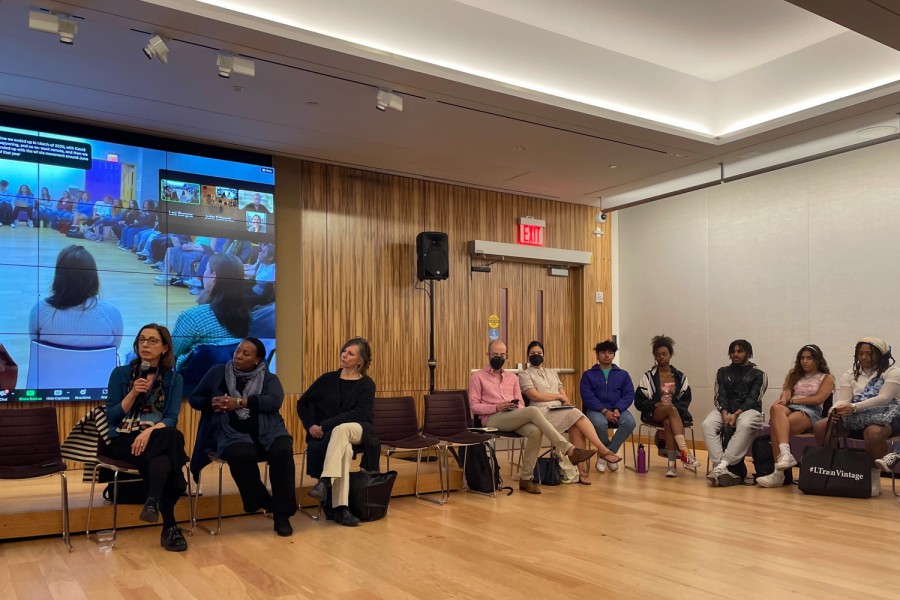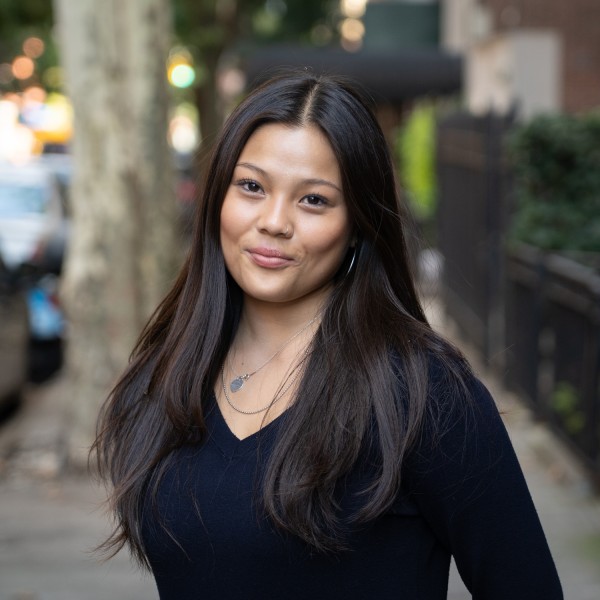NYU to resume merit scholarships for MLK program after outcry
The university announced that it will resume merit-based scholarships for students in its flagship MLK Scholars program, following years of criticism from students.
Students meet with administrators at NYU’s Bonomi Family Admissions Center to voice their concerns regarding the university’s MLK Scholars program. (Sabrina Lee for WSN)
April 14, 2023
NYU will reinstate merit scholarships for all students in its Martin Luther King, Jr. Scholars honors program, nearly two years after it decided to discontinue merit-based aid for students who applied after the 2020-21 admissions cycle. The policy change comes after years of pressure from students, including current first-years and sophomores, who said the discontinuation of merit scholarships was not made clear to them, and that they matriculated at NYU expecting to receive scholarships that never came.
When the current sophomore class of MLK Scholars students were applying to NYU, the program’s website misleadingly stated that both merit-based scholarships and need-based financial aid would be available to them, despite the fact that the university had decided to stop providing merit scholarships for incoming students. The inaccurate webpage was finally taken down in June 2021, a month after the enrollment deadline for those students passed, without any explanation or communication.
Ashley Mui, a sophomore in the MLK Scholars program, said a financial aid officer told her to expect around $35,000-40,000 in aid as part of the program after she was accepted during the 2021-22 application cycle. During her first semester, she was told she would not be receiving anything.
“I brought up my concerns during the second meeting — that my dad could possibly lose his job, and I was just concerned about where the promised scholarship had gone,” Mui said. “They told me, ‘Well, we shouldn’t have told you to expect that amount of money.’”
At a meeting on Tuesday, April 11, attended by approximately 40 undergraduates in the program, students demanded they be given the aid they thought they would receive when they accepted their NYU admission offer. Two days later, first-years and sophomores in the program received an email in which they were told they would now receive merit scholarships.
“The April 11 meeting between MLK scholars and NYU administrators was a very frank discussion at which students very openly shared their concerns and their experiences as participants in the program,” NYU spokesperson John Beckman said. “It is hoped that these changes will permit everyone involved in the program to move forward in a positive direction.”
The email, signed by two senior university administrators, said that the changes would be made by April 17, and that retroactive scholarship allocations for the current academic year would also be provided — a significant victory for the protesting students.
Students who receive need-based financial aid from the program that is less than the amount granted for merit-based aid will have their scholarship increased to match the merit scholarship grant. The email also said that the program is searching for a new director and will soon contact current sophomore students to establish how they might be compensated for the pause in merit-based aid during the 2021-22 academic year.
At the Tuesday meeting that led to the policy change, MJ Knoll-Finn, one of the administrators who later authored the email to students, said that she recalled students having been informed of the change before the enrollment deadline, but students said this was not the case. Knoll-Finn serves as NYU’s senior vice-president for enrollment management and student success, and oversees the university’s admissions and financial aid offices.
“I cannot go into right now your assertion that we told you you would be getting the aid, for those of you who are sophomores. My recollection is that this was a situation where students were told this before May 1,” Knoll-Finn said. “I am not a scam artist, and I do take offense to that considering that I have given my life’s work here.”
Amy John-Terry, a sophomore in the program, addressed Knoll-Finn directly at the meeting, accusing her of trying to evade accountability.
“I’m horrified at the way that you, specifically, have been speaking to the students who have been sharing their experiences to conflate your own experience to a student that is visibly crying and sobbing and telling you about her personal struggles,” John-Terry said. “Especially as a white woman to a roomful of Black and Brown and POC students.”
The MLK Scholars program has long been criticized by its students, who, in 2020, criticized it for engaging in tokenism and performative activism. An open letter from MLK scholars to program staff penned earlier this year called the program a “misleading emblem of the university” and “a tool to garner social capital.” The writers of the letter noted that the program’s budget had increased by $6 million only three years ago, and questioned why the added funding was not allocated toward maintaining merit-based scholarships.
According to the letter, current sophomores were also told they would receive a grant of $7,500 to be used for research or go toward summer study at NYU. The students said that this, too, was never received.
Beckman previously said that at the time, the MLK Scholars program had opted to provide more need-based aid to students rather than give all of those enrolled in the program merit-based scholarships.
Rohail Jafri, a sophomore in the program who co-wrote the open letter, said that while she is glad that the university decided to address the concerns of MLK Scholars, students will still continue to advocate for the program to be improved.
“There is still more to be done,” Jafri said. “The other scholars and I don’t intend to stop our efforts to improve the program and maximize funding for the cohorts.”
Contact Sabrina Lee at [email protected].

























































































































































